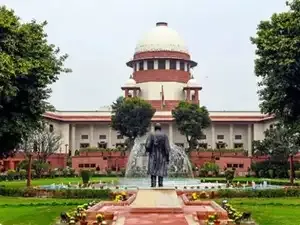A five-member constitution bench of the Supreme Court on Tuesday said that the presidential reference case on whether the top court can lay down timelines and procedures for the President and state governors while considering bills passed by state legislatures will be heard from August 19.
A constitution bench comprising Chief Justice of India (CJI) BR Gavai, Justices Surya Kant, Vikram Nath, PS Narasimha and Atul S Chandurkar assured counsels for Kerala and Tamil Nadu government that the bench would first hear them on the issue of maintainability.
Both Kerala and Tamil Nadu governments have objected to the presidential reference urging the constitution bench to return the reference to the President. "We will hear parties on maintainability first...Time schedule will be strictly followed. Let parties complete arguments as prescribed," the bench ordered. In its application opposing the maintainability of the presidential reference, the Tamil Nadu government has argued that the reference is not maintainable. The Tamil Nadu government has argued that the move is an attempt by the President to reopen settled law on the powers of governors under Article 200 and of President under Article 201 of the Constitution. "It is prima-facie evident that the present presidential reference is nothing but an appeal in disguise... Therefore, the presidential reference dated May 13 deserves to be unanswered as a whole and liable to be returned," the Tamil Nadu government stated in its application.
On May 15, in a rare move, President Droupadi Murmu invoked Article 143 (1) of the Constitution to send a reference to the SC following its April 8 ruling that set timelines for governors and the President to grant assent to bills passed by state legislatures. In her reference, the President posed 14 questions to the SC. Article 143(1) of the Constitution allows the President to seek the SC's opinion in matters of legal and public importance.
Invoking the rarely used Article 143 (1), President Murmu said in the present circumstances, it appears that the following questions of law have arisen, and they are of such nature and public importance that it is expedient to obtain the opinion of the SC thereon. The President has sought the SC's opinion on whether such deadlines can be imposed judicially.
A constitution bench comprising Chief Justice of India (CJI) BR Gavai, Justices Surya Kant, Vikram Nath, PS Narasimha and Atul S Chandurkar assured counsels for Kerala and Tamil Nadu government that the bench would first hear them on the issue of maintainability.
Both Kerala and Tamil Nadu governments have objected to the presidential reference urging the constitution bench to return the reference to the President. "We will hear parties on maintainability first...Time schedule will be strictly followed. Let parties complete arguments as prescribed," the bench ordered. In its application opposing the maintainability of the presidential reference, the Tamil Nadu government has argued that the reference is not maintainable. The Tamil Nadu government has argued that the move is an attempt by the President to reopen settled law on the powers of governors under Article 200 and of President under Article 201 of the Constitution. "It is prima-facie evident that the present presidential reference is nothing but an appeal in disguise... Therefore, the presidential reference dated May 13 deserves to be unanswered as a whole and liable to be returned," the Tamil Nadu government stated in its application.
On May 15, in a rare move, President Droupadi Murmu invoked Article 143 (1) of the Constitution to send a reference to the SC following its April 8 ruling that set timelines for governors and the President to grant assent to bills passed by state legislatures. In her reference, the President posed 14 questions to the SC. Article 143(1) of the Constitution allows the President to seek the SC's opinion in matters of legal and public importance.
Invoking the rarely used Article 143 (1), President Murmu said in the present circumstances, it appears that the following questions of law have arisen, and they are of such nature and public importance that it is expedient to obtain the opinion of the SC thereon. The President has sought the SC's opinion on whether such deadlines can be imposed judicially.





